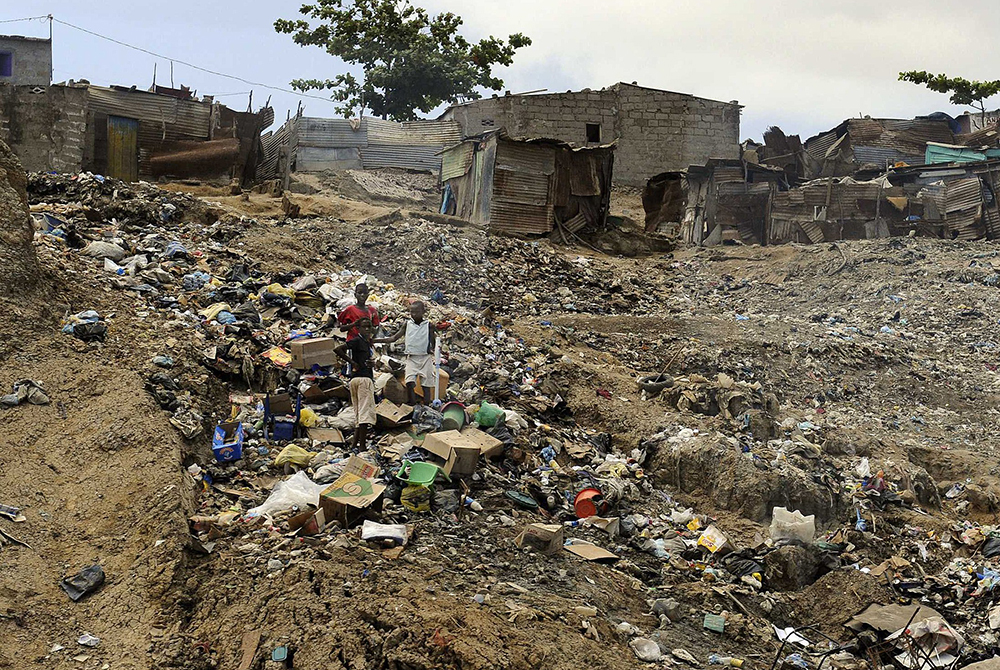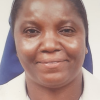
Children are pictured in a file photo in a poor section of Luanda, Angola. (CNS/Alessandro Bianchi, Reuters)
Mona a difundo Wphalakata.
This is a saying in my mother tongue, Kymbundu, and means, "The orphan must keep her chin up to overcome life's challenges."
My life as a Good Shepherd Sister is a mystery to me, a country girl from a farm family in Kalanda village, part of the municipality of Camabatela in northern Angola. I was born one year after the war for independence started, but my childhood with a loving family was peaceful at first. As the civil war escalated, the insurgents sought out educated men, forcing my father to hide in the woods for fear of being killed. Unable to get treatment for an illness, he died at age 46 when I was 14. My 16-year-old brother was forced to join the army, along with six uncles.
As men were conscripted and dying, women took over leadership, working in the fields and supporting the children. My family fled to another village where I was able to resume school. But at 18 years old, I was only in 4th grade. It was here that I met the Good Shepherd Sisters. Their life attracted me and while finishing school through grade 6, I spent two years in vocational discernment and entered religious life in 1982. The decision was a struggle because such a life choice was foreign to my family — not understanding, they resisted my choice. They also resisted because I was working to help my mother with finances. With God's grace, I overcame the obstacles and after reaching grade 8, entered the novitiate in October 1985.
As the war intensified, I felt like Job. My mother and grandmother died, my 12-year-old sister was kidnapped when our village was set on fire, and my brother was killed in the fighting. We were not allowed to have a funeral. All this loss was traumatizing and it has taken me years to make peace with it all. In 2017 I returned to our farm and discovered only a few palm trees. As I reflect on those painful times, I am filled with empathy for others in similar pain.
But women religious stepped forward throughout the war, at times risking their lives to care for the suffering and protecting the persecuted.
It was out of these experiences that my own passion grew, particularly for helping women and girls. When I first came to Luanda, I began my work as a social worker after finishing high school. Later I studied at the university, studying at night while serving as provincial leader. The following year, I was elected to the Central Leadership team of the congregation for the term of 2009-2015. After those six years in Rome, I went to Dublin, Ireland and obtained a master's degree, finally returning to Angola in 2018, to continue my work of empowerment.
Unfortunately, in February 2020, I was in Rome for a medical checkup, and got stranded by the COVID-19 pandemic. Thanks to technology I can continue some of my work in our province of Angola and Mozambique — the two Portuguese-speaking countries in Africa. I will be very happy to return to Angola when COVID-19 permits because "virtual" face-to-face ministry is challenging!
Currently I am director of mission development overseeing all the ministries of the province; luckily our team uses a project cycle management process that includes continuous processing of needs assessment, strategic planning, monitoring and evaluation. The part I enjoy most is visiting the projects and working with those managing them.
Our Good Shepherd goal is to empower women and girls — which is challenging because of our context. Angola, although a rich country filled with resources, does not do well in developing those resources for the good of the entire population.
Our history of war has created a need to rebuild infrastructure, but human development is slowed. And there is plenty of corruption — evident in the promises on television of great programs that never reach the people who need it. I have been trying for two years to get a tractor for one of our agricultural projects, and the file seems to pass from one office to another without any action. It is very discouraging.
Our capital Luanda is a perfect example of corruption. Talatona, the slum area where we work, is filled with families struggling to survive without electricity, water or sanitation. Survival efforts hardly allow time to look across the street — where families enjoy life with luxury condominiums, huge shopping centers, supermarkets, movie theaters and restaurants.
One of our clients is a single mother with four children. She does see those condominiums as she crosses the street to knock on their doors seeking cleaning jobs. Her shack lacks electricity; as she walks long distances to collect water, she scavenges for food from the condominium garbage containers.
Health care is probably the most serious lack for our people. There is a high child and mother mortality rate. Mothers do not have access to prenatal care, so children are born underweight. Without adequate food, many never survive preventable diseases.
Advertisement
A story that cries out to be heard is that of a 45-year-old widow with seven children. In 2017, she was selling bags of fresh water on the streets, but with inadequate income she came to us for help with school fees. Her 16-year-old son had not gone to school and became addicted to drugs. She wanted to prevent this for her other children. We gave her a part-time cleaning job, but cost of living in the city is very high — particularly food, because most is imported. She contracted cancer and — unable to get health care — died three years later. The children left behind now depend on their 18-year-old sister, who we hired to replace her mother. At least they have one meal a day. This family is only one of many in our area.
Our Good Shepherd community is small, only 25 of us, and our ministries are very diversified — because the needs of the community we serve are so diverse. Thankfully, we have lay mission partners, and our Good Shepherd International Foundation helps us find financial assistance so that we can pay skilled partners to assist us.
All Good Shepherd missioners gather three times a year for spirituality and charism training that help us to strengthen one another in the belief of our foundress, Mother Euphrasia, that "one person is of more value than the world." It keeps us trusting that work with individuals is very important, along with our work for systemic change. We collaborate as best we can with the government to support the programs important to us.
The World Bank reports that Angola has done much to reduce poverty and bring about reforms, but for us, it is very slow. The country lacks an adequate education system, especially for the rural population. Many children are still left behind. Primary enrollment is only 66.4% for girls and 88.8 percent for boys. At the moment Angola's spending on education is about 3% of the GDP, lower than the 4.4% average for Sub-Saharan Africa. Without education at all levels, unemployment will continue to be a huge deficit.
In spite of our many challenges, we keep our hope strong that the little we do will bear much fruit for the future of many.
[Rita Lourenço Luis is a Good Shepherd Sister from Angola, Africa. At the time of this writing, she is stranded in Rome by the pandemic, but continues to perform her work as director of mission development for the congregation's province of Angola and Mozambique.]





